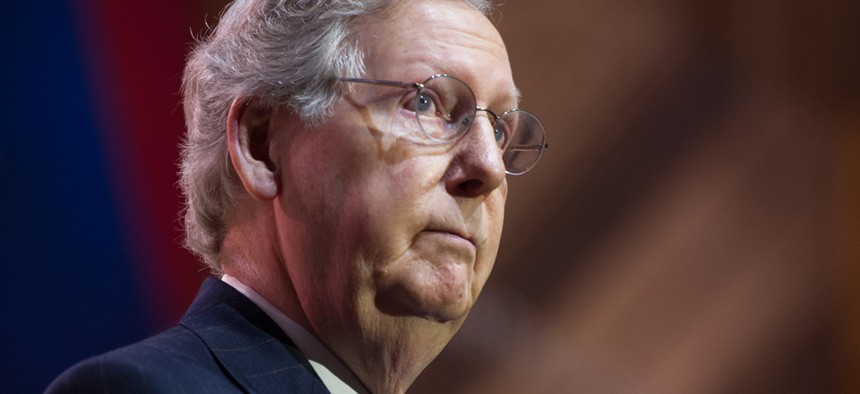
"We will not be shutting the government down or threatening to default on the national debt," McConnell said. Christopher Halloran / Shutterstock.com
Why Republicans May Have the Most to Lose Over Obama’s Immigration Action
If Obama moves, the GOP knows its reaction is what America is watching.
The first real test for the new Republican leadership is coming as President Obama prepares to go it alone on immigration.
Obama escalated his threat Friday during his trip to Myanmar, telling reporters that Congress has had "ample opportunity" to act and that he plans to move forward no later than the end of the year.
"I indicated to Speaker Boehner several months ago that if in fact Congress failed to act, I would use all the lawful authority I possess to try and make the system work better," Obama said.
Republicans from every corner of the party have pleaded with Obama to abstain from taking executive action and allow time for the new Congress to write a comprehensive plan to secure the border and bring the more than 11 million illegal immigrants in the country out of the shadows. Now, with Obama preparing to provide deportation relief to millions, and Republicans publicly entrenched to fight back, Washington appears to be bracing for a collision course.
The Republican Party may have the most to lose. Its reaction to Obama's move will set the tone for the GOP's agenda over the next two years and will reveal how committed the party is to actually leading. And the potential for another government shutdown looms if Republicans are ready to bring the immigration fight to the government-funding debate.
Senate Minority Leader Mitch McConnell, who will assume the top job in the chamber in January, took the mic on Capitol Hill Thursday at a press conference and appeared to recognize what is at stake. The leader said he was "disturbed" by the president's posturing since Republicans captured the majority in the Senate. Still, with his own agenda in mind, the pragmatic and shrewd 30-year Senate veteran promised that under no circumstances would executive action on immigration derail his vow to make the Senate work again. He pledged to pass a funding bill to keep the government open by the Dec. 11 deadline.
"We will not be shutting the government down or threatening to default on the national debt," McConnell said.
Across the Capitol, however, House Speaker John Boehner, who led his conference through a shutdown over health care in 2013, struck a much more combative tone.
"All of the options are on the table," he said. "We're going to fight the president tooth and nail if he continues down this path."
Boehner says he will take the temperature of his members in the upcoming days, a signal that he may be more willing than McConnell to engage in a showdown with the White House over immigration. Nearly 60 House Republicans have signed a letter calling for the next funding bill to include a provision that would "prohibit the use of funds by the administration for the implementation of current or future executive actions" on immigration. Even if such language passed the Senate, Obama would likely veto it.
Rick Tyler, a Republican strategist who worked for former House Speaker Newt Gingrich, says Republicans must take bold actions now to assert their abilities as leaders.
"You cannot allow this president, or any other president, to act unilaterally on an issue when he does not have the authority," Tyler said. "If Congress wants to cede the authority, it will be applied to the next issue and the next issue."
Some House Republicans including Rep. Steve King of Iowa, have even hinted that they'd like to move forward with impeaching Obama if he takes executive action on immigration.
Rep. Joe Barton of Texas, told Newsmax TV that "impeachment is indicting in the House, and that's a possibility."
Some Republican aides have floated the idea of passing a clean funding bill in December and then using the tedious appropriations process in 2015 to keep Obama from carrying out his executive action. But the president would never sign those funding bills, putting the country, once again, on the path to a shutdown.
"I think it is dangerous for Republicans to try and withhold funding or play with anything that can lead to a government shutdown," says John Feehery, a GOP strategist who was a spokesman for then-House Speaker Dennis Hastert.
Feehery says shutting the government down over immigration could hurt Republicans with Hispanic voters as the party sets its sights on the White House in 2016. Instead of digging in against executive action, he says it's time that the party "takes this as an opportunity" to come up with its own plan.
Republican Sen. Lindsey Graham of South Carolina says he wants the White House to give the new Congress six months to prove it can pass immigration reform.
"If we cannot get our act together to pass a sensible solution, then we are going to get pounded," Graham said.
Republicans recognize they are walking a fine line as they prepare to stand up against the president's immigration actions. McConnell and Boehner must assert themselves as leaders and also appease the most conservative voices in their conference—all while recognizing that shutdowns and impeachment efforts can damage the party politically, at least in the short term.
Democrats managed to translate impeachment threats into cold, hard campaign cash this year, and polls taken after the 2013 government shutdown showed the GOP's brand was badly damaged. If Republican leaders want to use the next two years in Congress to make their case to the American people that the GOP is ready to lead, the party might have to show some restraint.
Sen. Jeff Flake of Arizona, an architect of the Senate's comprehensive immigration bill that stalled in the House, said if Obama acts, it will make it harder for Republicans and Democrats to forge a path to pass immigration laws. Still, he said, there are efforts going forward in Congress right now to restart the comprehensive immigration debate.
"My position is that we ought to pass substantive reform," Flake said. "What Obama is going to do is probably not going to be much different from what we had. The problem is, when he does that, he just makes it more difficult to get the other provisions that we really need."
Sen. John McCain of Arizona, another member of 2013's so-called Gang of Eight, says this time, however, immigration reform will need to start in the House.
"I know Speaker Boehner would like to move forward," McCain said. "The threat of the president saying he is going to act by executive order is hanging over everything."
(Image via Christopher Halloran / Shutterstock.com)
NEXT STORY: Return of the Veto?







